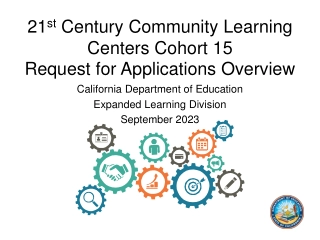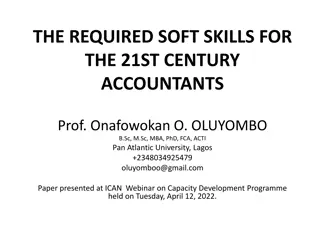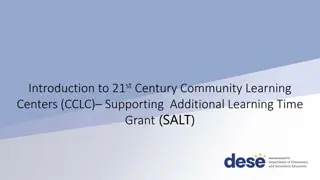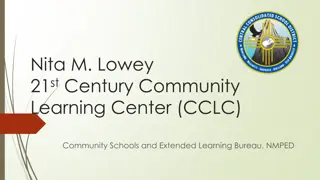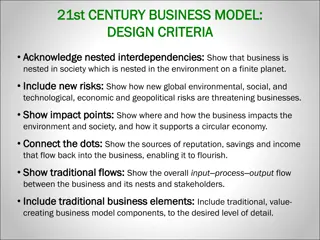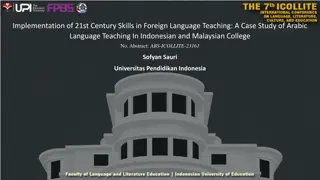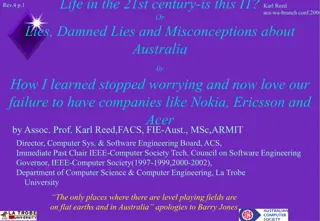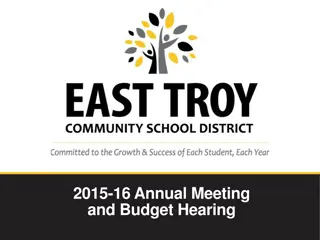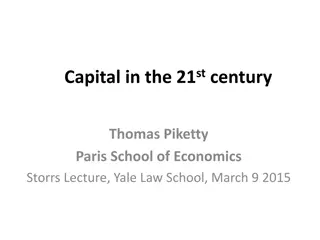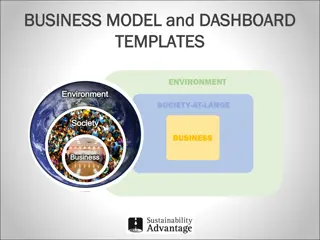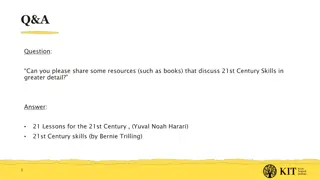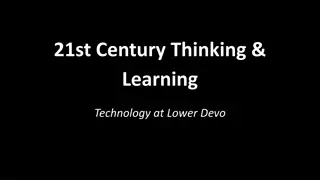The Learning Quality Framework: Empowering Schools for 21st Century Learning
The Learning Quality Framework empowers schools to aspire towards outstanding learning outcomes, nurturing creativity, independence, and preparing students for the challenges of the 21st century. It provides a developmental framework focused on creative, independent learners and inspirational teaching, fostering a collaborative learning culture. The framework scaffold's a school's learning journey through quality standards, consultation, and external reviews, emphasizing key aspects like teaching culture, assessment, leadership, and curriculum design.
- Learning Quality Framework
- School Aspirations
- 21st Century Learning
- Educational Excellence
- Student Empowerment
Download Presentation

Please find below an Image/Link to download the presentation.
The content on the website is provided AS IS for your information and personal use only. It may not be sold, licensed, or shared on other websites without obtaining consent from the author. Download presentation by click this link. If you encounter any issues during the download, it is possible that the publisher has removed the file from their server.
E N D
Presentation Transcript
Schools with aspirations for learners Does your school aspire to: equip young people to take responsibility for their own learning and prepare them for 21stcentury life ? make world-class learning your educational goal? surpass any inspection framework s expectations for teaching and learning with ease and confidence? nurture greater autonomy, creativity and independence of thought in young people? play a more expansive educational game? 2
The Learning Quality Framework: makes these vital, challenging aspirations DO-ABLE; has a Quality Standard at its core; untangles and describes the features of a learning school; offers steps in the learning journey; promotes progression through review and/or verification; is based on the learning sciences and principles of learning organisations. 3
The Learning Quality Framework A rigorous developmental framework to guide a school towards delivering outstanding learning, leading to: Creative, independent learners who achieve well and are prepared for the challenges of 21st century living Inspirational teaching that expands young people s capacity and appetite to learn A collaborative learning culture that supports experimentation and personal responsibility for all . 4
The Learning Quality Framework The LQF scaffolds the school s learning journey through; a quality standard that captures key aspects of a school s learning culture materials and consultancy to assist in diagnosis and action planning external reviews of progress or verification of levels 5
What does such an aspiration encompass? Teaching culture A common language for learning Assessment and progression Vision Student engagement Learning Sciences Communities of enquiry Learning culture Leadership for learning Curriculum design Engagement of parents and communities Commitment | Plans/strategies | Action | Evaluation 7
The LQF structure 4 Dimensions: Commitment, Planning, Action, Evaluation 12 Principles: based on different aspects of school culture 32 Indicators: how the principles are realised in practice across four phases of development 8
LQF structure Principles Indicators Bronze Silver Gold Platinum Commitment 1 Vision 2 Learning philosophy 3 Language of Learning Plans/strategy 4 Leadership 5 CPD Action 6 Curriculum 7 Teaching culture 8 Learning culture 9 Learner engagement 10 Parents Evaluation 11 Assessment (learning habits) 12 Evaluation 9
LQF phases of development Starting out (bronze) Beginning to have a radical re-think about the purpose of education, Casting around and trying out ideas. Developing (silver) Has found or developed a best-fit learning strategy, Increasingly putting this into practice. Establishing (gold) Learning approach secured and working well, Deeply embedded, not reliant on a few leaders. Enhancing (platinum) Continual enhancement, Impact now beyond the school. 13
At Bronze level . . . Indicator 7.2. Lead teachers are beginning to talk about learning and how it works. They use the school s emerging language for learning and encourage students to use it to talk about their learning. Documentary and/or video evidence from learning walks will show that this is beginning to happen. Observations will confirm that some teachers are taking opportunities that arise naturally to notice and discuss how students are learning during lessons and in review points. Interviews with lead teachers will show that teachers (usually through small scale enquiries) are exploring the effects of this and how to plan for it. Interviews with students of lead teachers will confirm that some students are developing a vocabulary with which to discuss the learning process.
At Silver level . . . Indicator 7.2 Talk about the learning process - verbal and feedback - is embedded in the everyday conversations of many classrooms and alerts students to the learning behaviours they are using and improving. Documentary evidence from learning walks and learning reviews show that this is happening across a range of subjects / phases; Schemes of Learning and planning proformas will have been adapted. Observations confirm the above. Interviews with teachers will show that they are able to use the learning language relatively fluently. They are becoming increasingly at ease with this way of working Interviews with students will demonstrate that most students are able to discuss the learning process clearly and confidently, using the school's language for learning.
At Gold level . . . Indicator 7.2 Most practitioners use a language for learning fluently to help cultivate and improve students understanding of their growth as learners. Use of the school s map of progression in learning behaviours keeps the language fresh and useful. Documentary evidence demonstrates that Schemes of Learning and planning proformas etc. show planned progression. Observations will confirm that most lessons are characterised by: dual focused learning outcomes; fluency and purpose in the learning language; review points that routinely address both content acquisition and the effect of the learning process. Interviews with teachers will show that teachers are comfortable with working in this way and that they are fluent in the school s chosen language of learning. Interviews with students will demonstrate that they are able to discuss the learning process clearly using the school's language for learning and have an accurate sense of how they are developing as learners.
Using The Learning Quality Framework Four useful functions: Diagnostic assess current position (secure, develop, start). Formative develop plans based on the indicator paths. Summative external review and/or formal verification of progress. Evaluative report guides further development. 17
Support for the LQF learning journey Phase 1 Diagnosis and action planning: An online step by step journey guide from audit through to assessment and beyond offering: The LQF standard in full Self-audit tools Other tools to aid development planning The School Development Guide a manual that unpacks the indictors and suggests how you might achieve them A Level Review Chart for detailing evidence 18
Recognising success in the LQF journey Phase 2 Review and/or Verification Processes: A desk-top pre-verification check A planning tool, to help schools to prepare for review or verification Phone and email support prior to verification An on-site visit to conduct interviews, lesson observations, a school; tour and documentation scrutiny(for above Bronze level) A report, based on the evidence, to assist future planning Award of a Learning Quality Mark on reaching a verified level. 20
Benefits of The Learning Quality Framework it provides the big picture and the staged journey towards the most important aspiration for your school it aligns you to the most demanding challenge you have it will form the basis of your school development plan for years ahead it stimulates you to think deeply about learning and - since you are an experienced professional - enables you to generate your own answers and solutions. 21



